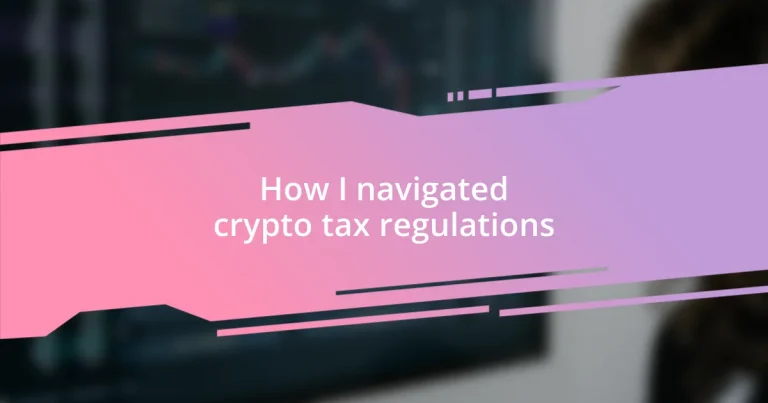Key takeaways:
- Understanding that each cryptocurrency transaction can trigger taxable events is crucial for compliance.
- Maintaining thorough records of all transactions helps avoid potential misreporting and reduces stress during tax season.
- Seeking professional tax advice can clarify complex regulations and provide strategies for minimizing tax burdens effectively.

Understanding crypto tax basics
When I first began diving into the world of cryptocurrency, the idea of taxes left me feeling a bit overwhelmed. It felt like stepping into a maze without a map. But understanding the basic principles was crucial; after all, the IRS treats cryptocurrency as property, which means each transaction can potentially trigger a taxable event. Have you ever felt that knot in your stomach during tax season? Trust me, I’ve been there.
As I navigated my own crypto journey, it became clear that knowing what qualifies as a taxable event is essential. Selling, trading, or even exchanging crypto for goods can all influence your tax liability. I vividly recall a time when I impulsively traded some Bitcoin for altcoins without considering the tax implications—only later did I realize that even minor transactions could lead to significant tax consequences. Has that ever happened to you?
Sometimes, I find myself reflecting on how easy it is to overlook the importance of record-keeping in crypto transactions. I learned the hard way that tracking my trades, dates, and amounts is vital. If you’re like me, you might think, “How hard can it be?” but let me assure you, a thorough record helps make tax time so much less stressful. The emotional relief of having everything organized cannot be overstated!
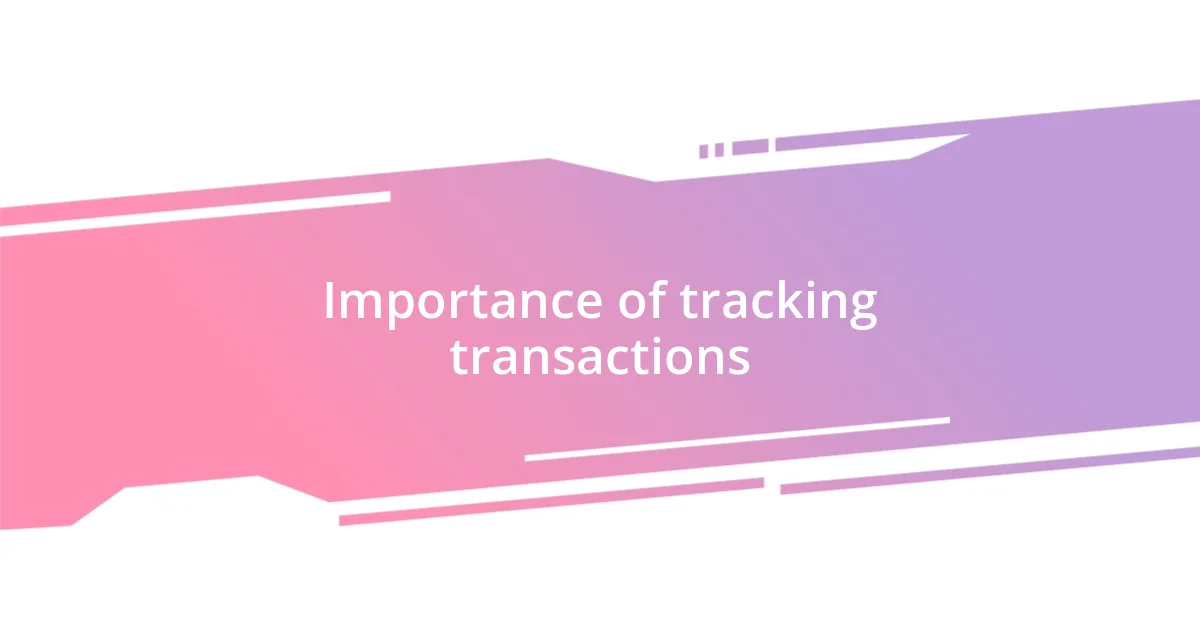
Importance of tracking transactions
Documenting every transaction is more than just a bureaucratic task; it’s your shield against the chaos of tax season. I’ve had moments when I thought I could remember every trade I made, but those memories faded quickly, leaving me scrambling for details. It’s far too easy to let excitement lead to oversight. Trust me, when I finally sat down to compile my records, I was shocked at how many small trades I had made that added up to significant potential tax impacts.
Here are some key reasons why tracking transactions is crucial:
- Accuracy: Knowing your exact trade history helps avoid misreporting income or losses.
- Tax Benefits: Detailed records can help you identify deductible losses and offset gains.
- Audit Protection: Should the IRS knock on your door, having organized records could strengthen your defense.
- Stress Reduction: The more organized you are, the less anxiety you’ll feel when taxing obligations approach.
- Informed Decisions: Keeping track of transactions gives you better insights into your investment strategies and outcomes.
It’s like keeping a journal of your financial journey. I can’t stress enough how relieving it is to have everything in one place, especially when the IRS is involved!
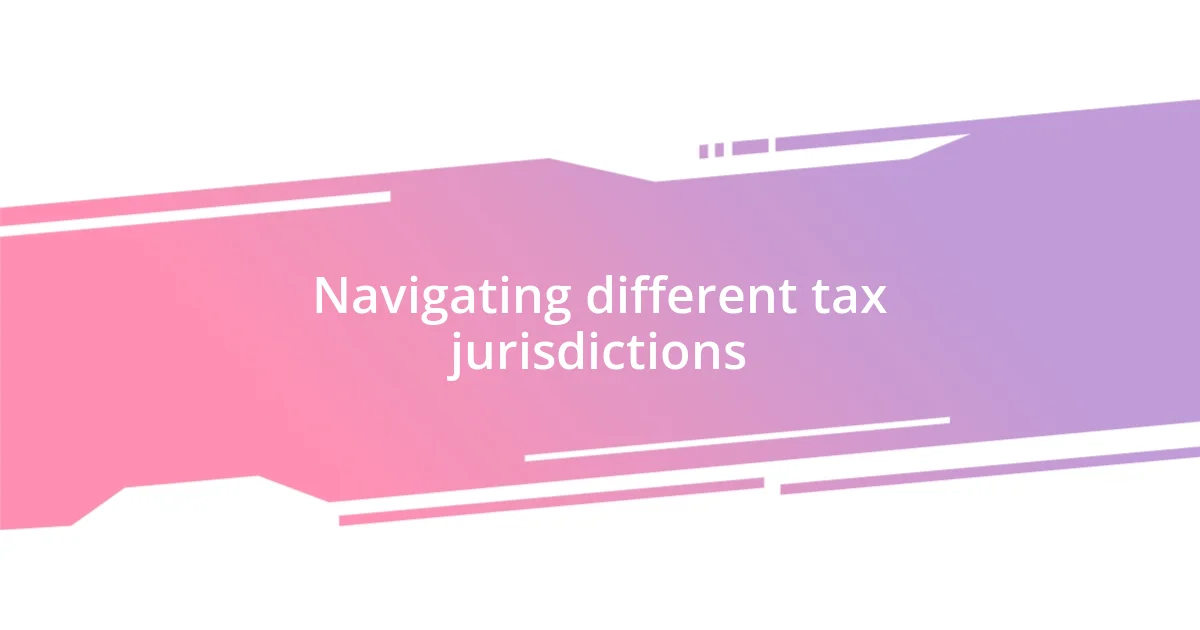
Navigating different tax jurisdictions
Navigating different tax jurisdictions can feel like a daunting task, but I quickly realized that each country has its own approach to crypto taxation. For example, in the United States, crypto is treated as property, while places like Germany offer a tax-free threshold for long-term holdings. I found it fascinating how one decision can impact my tax obligations depending on where I reside. Have you ever thought about how your location affects your investments?
My journey involved diving into various international regulations. I remember feeling a mix of curiosity and apprehension as I read about jurisdictions like Portugal, where there’s no tax on crypto gains for individuals. It made me think about the potential benefits of relocating, but then I questioned whether it was worth the hassle and uncertainty. It was eye-opening to see the drastic differences that could change my financial outlook significantly. What about you—would you consider moving for tax benefits?
To simplify my understanding, I found it helpful to create a comparison table of regulations in different countries. This allowed me to visualize the potential implications for my investments and made my research much more manageable. It was surprising how some areas were much more welcoming to crypto enthusiasts than others.
| Country | Tax Treatment of Crypto |
|---|---|
| USA | Treated as property; taxed on capital gains |
| Germany | No tax after one-year holding period |
| Portugal | No tax for individuals on crypto gains |
| UK | Capital gains tax applies |
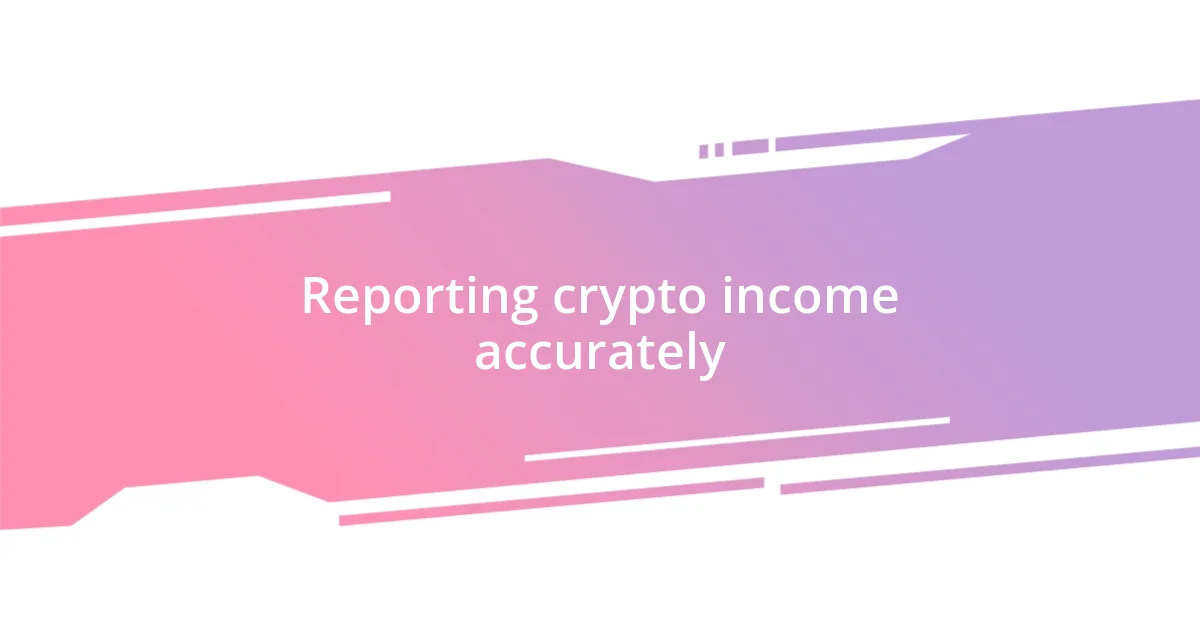
Reporting crypto income accurately
Accurately reporting crypto income can often feel overwhelming, but I’ve learned that a systematic approach makes all the difference. I remember the panic I felt last year when I realized I had numerous small transactions to account for. It struck me: what if I misreported even a single trade? The thought of an audit chased me. By carefully documenting each trade, I not only ensured compliance but also gained a deep understanding of my financial landscape.
Every time I tallied my trades and gains, I was reminded of the volatility of cryptocurrencies. It’s exhilarating to ride those highs, but each transaction carries tax implications that should never be brushed aside. I’ve found it incredibly empowering to stay organized; not only does it protect me from potential penalties, but it also allows me to strategize better for future trades. Have you ever considered how being precise about your reporting can open doors to smarter investing?
Mistakes in reporting can lead to costly repercussions, which is a reality I faced firsthand. During one particularly taxing season, I forgot to include some minor trades, and it pointed out a critical lesson: never underestimate the little things. I started using software that integrates with my wallets and exchanges. This tool automatically logs my transactions, giving me peace of mind and a clearer picture of my earnings. Isn’t it fascinating how technology can simplify such a complex task?

Common mistakes to avoid
One common mistake I encountered was not keeping thorough records of all my transactions. It’s so easy to overlook minor trades or forget about staking rewards, but if you don’t document everything, you could face big headaches later. I learned this the hard way after a particularly chaotic tax season where I scrambled to piece together my history. It made me realize the value of consistent record-keeping. Have you ever felt that rush of panic when you can’t find a piece of important information?
Another pitfall is misunderstanding the tax implications of crypto transfers. I once assumed that transferring coins between wallets wouldn’t trigger any tax events, only to discover that each transfer must be accounted for as per the fair market value at the time of transfer. This misstep made me rethink my approach. I started keeping a detailed log of every move—like a digital diary for my assets—ensuring I wasn’t blindsided come tax time. Have you considered how seemingly simple actions can complicate your tax situation?
Finally, I’ve seen others make the mistake of not seeking professional advice, especially when navigating the intricate web of crypto taxes. When I finally decided to consult a tax professional, I felt a weight lift off my shoulders. They provided nuanced insights into my specific situation that I simply couldn’t grasp alone. I can’t stress enough how beneficial it can be to have expert guidance, especially in a rapidly changing landscape. Isn’t it comforting to know that someone knowledgeable can help you avoid potential pitfalls?

Seeking professional tax advice
I vividly remember the day I finally reached out to a tax consultant about my cryptocurrency dealings. The relief that washed over me was palpable. Suddenly, all those worries about misclassifying my gains or misinterpreting regulations faded away. I think many people underestimate how critical expert advice can be. Have you ever felt overwhelmed and wished you had someone to help guide you through the maze?
One of the most enlightening moments during my consultation was when the tax professional highlighted the nuances of reporting staking rewards. I had assumed these were simple additions to my income, but the tax implications were quite specific. Learning about how different states treat crypto income differently opened my eyes to the complexity I had previously ignored. It’s amazing how one conversation can reshape your entire perspective. Have you considered how a small detail could drastically alter your tax obligations?
I noticed that seeking professional tax advice didn’t just clarify my current situation; it also put me in a position to make informed decisions moving forward. My consultant offered strategies to minimize my tax burden without skirting the law. The proactive approach we developed made me feel empowered and prepared for future trading activities. If you’re still debating whether to seek help, I urge you to consider what a difference expert insights could make for your peace of mind. Isn’t it wise to turn uncertainties into opportunities?
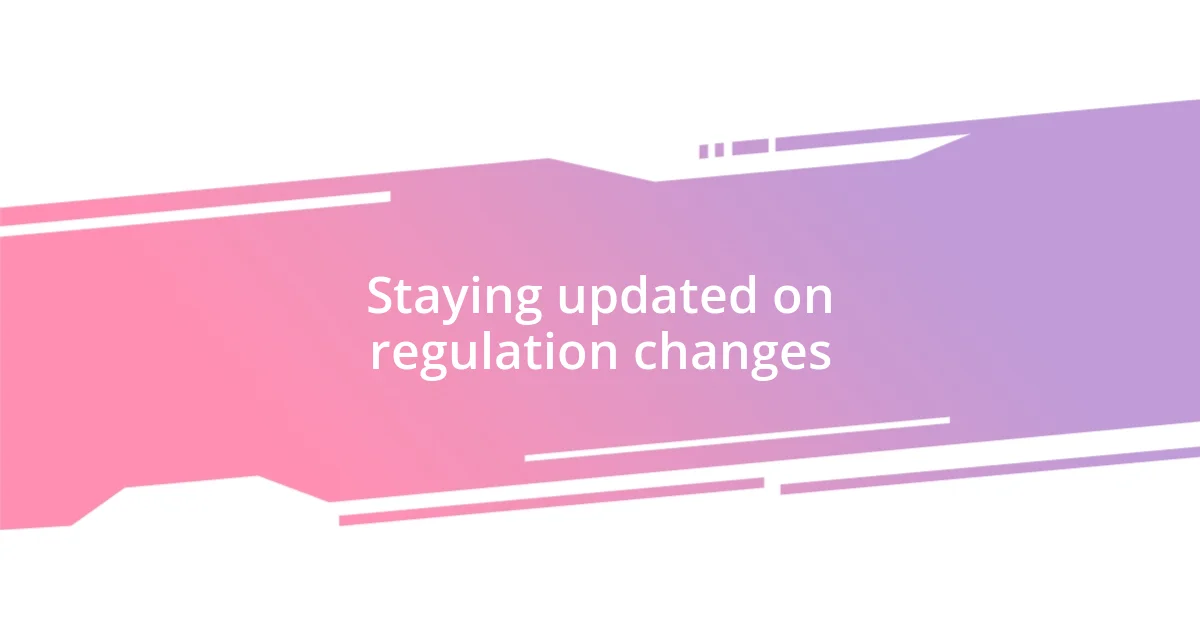
Staying updated on regulation changes
Staying updated on crypto tax regulations can feel daunting, but I’ve found a few effective tactics that keep me informed. I often rely on trusted news sites and dedicated crypto tax blogs. These resources not only report on changes, but also break down the implications in clear, practical terms. Have you ever clicked through a dense article only to walk away more confused? Finding the right source can make all the difference.
I’ve also joined online communities where fellow crypto enthusiasts share updates and experiences related to tax regulations. I remember participating in a forum discussion about an unexpected tax ruling that I hadn’t heard about elsewhere. The insights shared by others experiencing the same issues were invaluable. It’s like having a support group dedicated to navigating the murky waters of crypto tax. Wouldn’t you agree that sometimes collective wisdom can illuminate the path forward?
Every quarter, I set aside specific time to review any regulatory announcements or changes. This simple habit has transformed the way I approach my trading and taxes. I no longer feel like I’m scrambling to catch up; instead, I feel proactive and prepared. Have you thought about how regular check-ins with evolving regulations could transform your own strategies? With each update I absorb, it not only calms my nerves but empowers me to make informed decisions in this fluctuating space.












